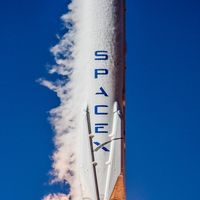Solar Storm Disrupts Musk's Starlink Satellites
May 14, 2024, 6:51 am

Location: United States, District of Columbia, Washington
Employees: 1001-5000
Founded date: 2002
Total raised: $7.53B
The recent surge in solar activity has unleashed a powerful geomagnetic storm that has sent shockwaves through Elon Musk's Starlink satellite network. This unprecedented event has led to a state of "degraded service" for Starlink users, as the Earth grapples with the most intense geomagnetic storm in over two decades.
Elon Musk himself acknowledged the strain that the storm has placed on the Starlink satellites, but reassured the public that they are holding up admirably under the circumstances. With Starlink commanding a dominant position in the satellite internet industry, owning a staggering 60% of the approximately 7,500 satellites orbiting Earth, the impact of this disruption is felt far and wide.
The US National Oceanic and Atmospheric Administration (NOAA) has confirmed that this storm ranks as the most significant since October 2003, underscoring the severity of the situation. The storm's persistence over the weekend poses risks to critical systems such as navigation, power grids, and satellite communication, raising concerns about the broader implications of such space weather events.
Starlink's innovative network of low-Earth-orbiting satellites relies on cutting-edge laser connections to facilitate rapid data transmission, enabling seamless global internet coverage. However, the intense pressure exerted by the geomagnetic storm has put this network to the test, highlighting the fragility of space-based technologies in the face of nature's fury.
As the world grapples with the aftermath of this solar storm, the resilience of Starlink's satellites serves as a testament to human ingenuity in the face of adversity. The disruption caused by this event underscores the need for continued innovation and preparedness in the realm of satellite technology, as we navigate the unpredictable waters of space weather and its impact on our interconnected world.
Elon Musk himself acknowledged the strain that the storm has placed on the Starlink satellites, but reassured the public that they are holding up admirably under the circumstances. With Starlink commanding a dominant position in the satellite internet industry, owning a staggering 60% of the approximately 7,500 satellites orbiting Earth, the impact of this disruption is felt far and wide.
The US National Oceanic and Atmospheric Administration (NOAA) has confirmed that this storm ranks as the most significant since October 2003, underscoring the severity of the situation. The storm's persistence over the weekend poses risks to critical systems such as navigation, power grids, and satellite communication, raising concerns about the broader implications of such space weather events.
Starlink's innovative network of low-Earth-orbiting satellites relies on cutting-edge laser connections to facilitate rapid data transmission, enabling seamless global internet coverage. However, the intense pressure exerted by the geomagnetic storm has put this network to the test, highlighting the fragility of space-based technologies in the face of nature's fury.
As the world grapples with the aftermath of this solar storm, the resilience of Starlink's satellites serves as a testament to human ingenuity in the face of adversity. The disruption caused by this event underscores the need for continued innovation and preparedness in the realm of satellite technology, as we navigate the unpredictable waters of space weather and its impact on our interconnected world.
